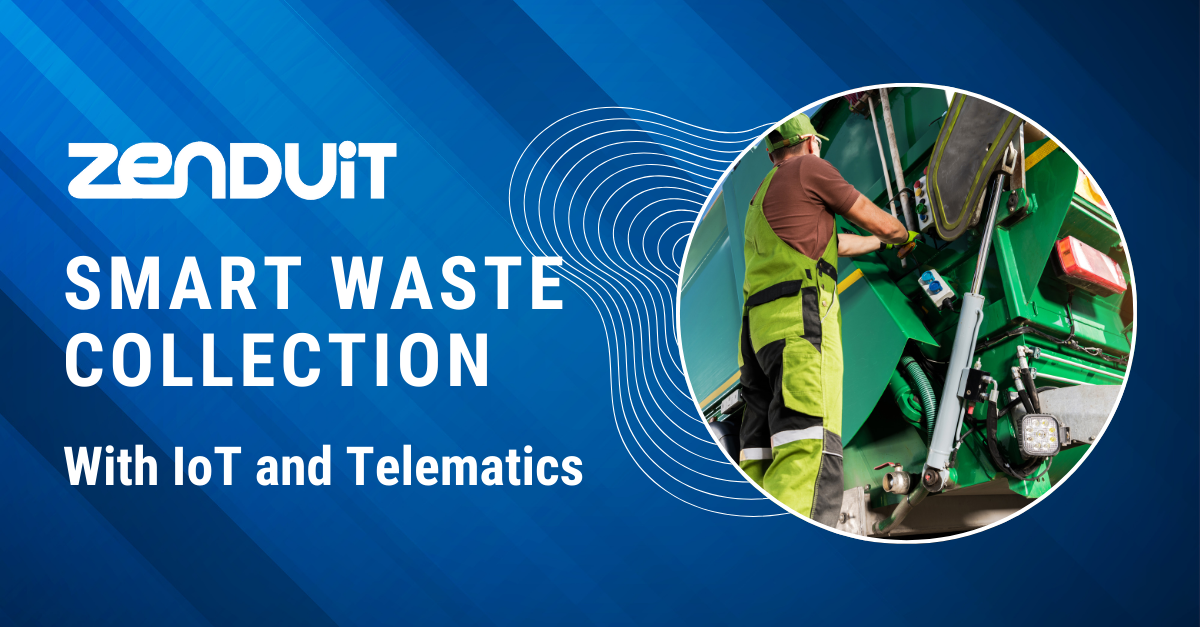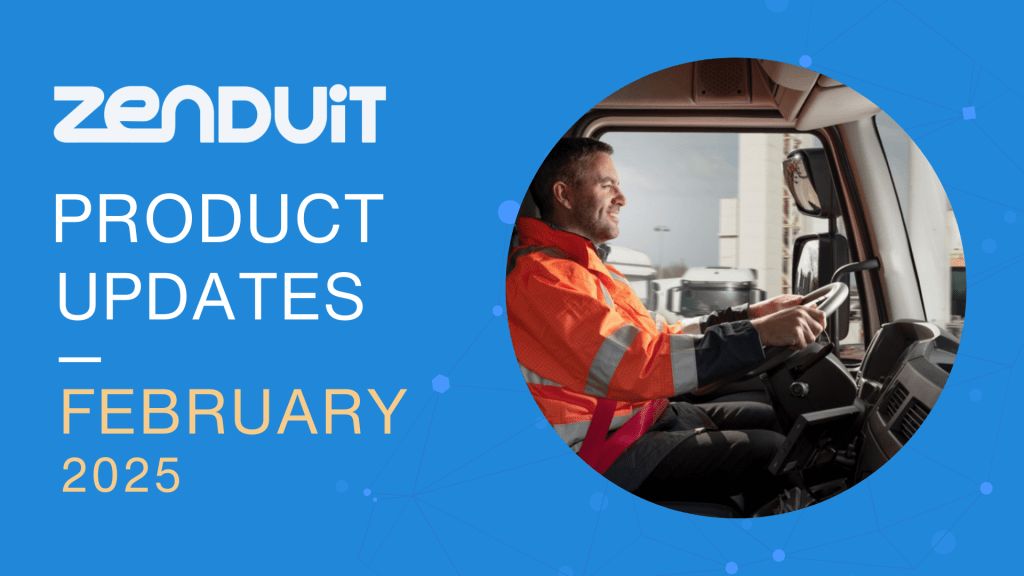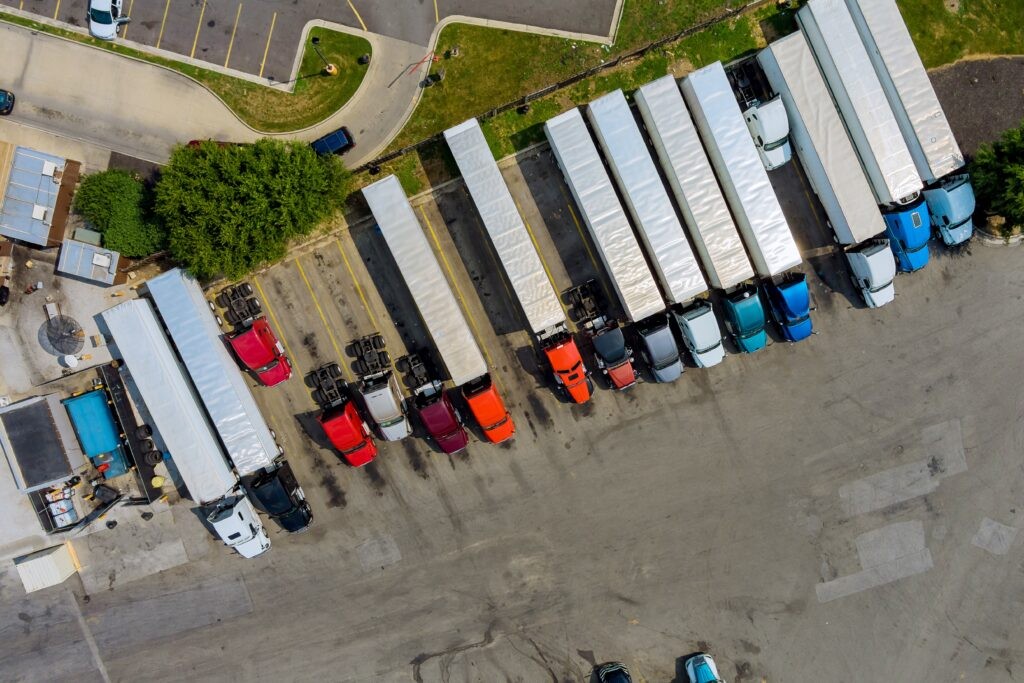Traditional waste collection has always had its issues with inefficiency and environmental impact; overflowing bins and missed pickups.
Many ill-managed collections can frustrate residents and strain municipal budgets; the EPA also found that inefficient waste collection boosts greenhouse gas emissions, with transportation making up 29% of the total U.S. emissions in 2021.
Fortunately, there’s a solution on the horizon: smart waste collection with IoT and telematics. By using advanced tech, waste management becomes more efficient, cost-effective, and eco-friendly. For example, smart bins with sensors can check fill levels in real-time, helping to optimize collection schedules and cut down on unnecessary trips. Plus, telematics systems offer data for better route planning, vehicle maintenance, and driver behavior improvement.
Integrating IoT and telematics into waste management isn’t just a tech upgrade; it’s a game-changer that tackles the main issues of traditional waste collection. By adopting these innovations, cities can really cut down on their carbon footprint, boost efficiency, and offer better services to their communities. As cities worldwide aim for sustainability, smart waste collection is a big step towards reaching those goals.
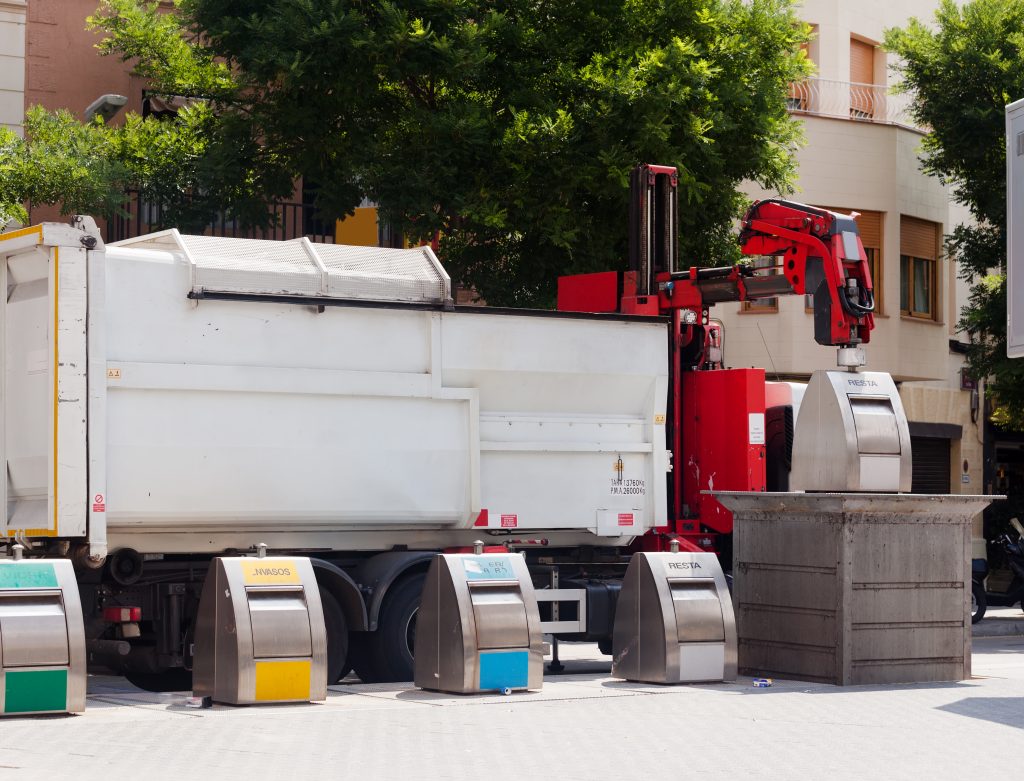
The Role of IoT in Waste Collection
In waste management, IoT applications are revolutionizing how waste is collected, monitored, and managed. IoT devices can be embedded in waste bins, trucks, and other infrastructure components to gather real-time information on waste levels, collection schedules, and vehicle performance. This data is then analyzed to optimize operations, reduce costs, and minimize environmental impact.
Smart Bins: Sensors and Data Collection
Smart bins are equipped with sensors that monitor fill levels, detect temperature changes, and even identify the type of waste being deposited. These sensors send real-time data to a central management system, which can then alert waste collection teams when a bin is nearing capacity or if there are any anomalies, such as a sudden temperature rise indicating a fire risk.
Real-Time Monitoring and Alert Systems
IoT-enabled waste management systems provide real-time monitoring and alert capabilities, allowing for immediate response to issues as they arise. Collection teams can receive alerts about overfilled bins, vehicle breakdowns, or route deviations, enabling them to address problems promptly. This not only improves service reliability but also enhances safety for both workers and the public.
Real-time data also allows for dynamic routing, where collection routes are adjusted based on the current state of bins and traffic conditions. This reduces fuel consumption, minimizes travel time, and lowers emissions.
The integration of IoT in waste management offers a number of benefits:
- Reduced Overflow: By monitoring fill levels in real-time, waste management teams can ensure bins are emptied before they overflow, maintaining cleaner public spaces and reducing the risk of health hazards.
- Optimized Collection Routes: Data from smart bins and vehicles can be used to create efficient collection routes, minimizing travel distance and time. This leads to lower fuel consumption and reduced emissions, contributing to environmental sustainability.
- Improved Efficiency: IoT-enabled systems streamline waste collection operations by providing actionable insights and automating routine tasks. This improves resource allocation, reduces operational costs, and enhances the overall effectiveness of waste management services.
As we move towards smarter cities, IoT will continue to play a crucial role in creating sustainable and efficient waste management systems.
The Power of Telematics
Telematics uses GPS technology, onboard diagnostics, and other data collection tools to monitor and manage waste collection vehicles. This technology provides real-time data on vehicle location, performance, and driver behavior, enabling more efficient and effective waste collection operations.
Maintenance Alerts and Vehicle Health Monitoring
Telematics can monitor engine performance, fluid levels, and other critical parameters to identify potential problems before they become serious. Maintenance alerts ensure that vehicles are serviced promptly, extending their lifespan and improving reliability.
For example, if a telematics system detects that a vehicle’s engine temperature is consistently higher than normal, it can send an alert to the maintenance team to investigate and address the issue.
Enhancing Driver Behavior and Safety
Telematics monitors driving patterns such as speed, braking, and acceleration to identify risky behaviors and provide feedback to drivers. This information can be used to implement training programs and incentives to encourage safer driving practices.
For instance, waste management companies can use telematics data to reward drivers who consistently exhibit safe driving behaviors, such as maintaining appropriate speeds and avoiding harsh braking. This not only reduces the risk of accidents but also improves fuel efficiency and reduces wear and tear on vehicles.
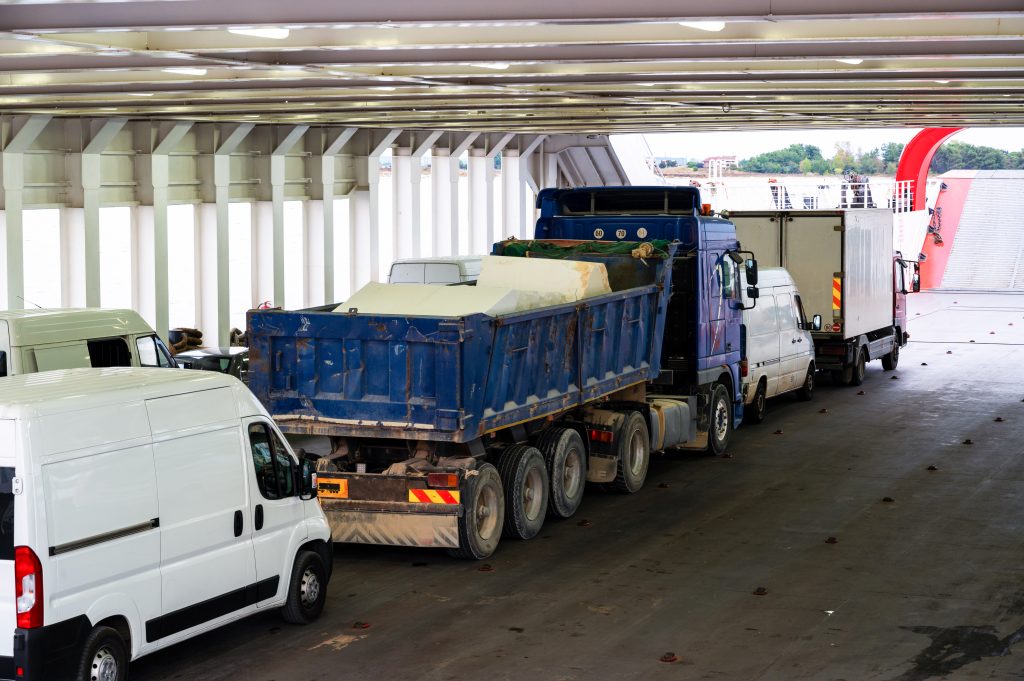
Benefits of Smart Waste Collection
Using smart waste collection systems offers many benefits for cities and waste management companies, including saving money, reducing environmental impact, improving service quality, and making decisions based on data.
Cost Savings and Operational Efficiency
With real-time data from IoT sensors and telematics, waste collection routes can be optimized to reduce the number of trips needed. This not only lowers fuel consumption but also decreases vehicle wear and tear, leading to reduced maintenance costs. According to a study by McKinsey & Company, smart waste management solutions can reduce operational costs by up to 30%.
Environmental Impact: Reduced Emissions and Fuel Consumption
Smart waste collection plays a big role in helping the environment by cutting down on emissions and fuel use. With better routes, trucks travel fewer miles, leading to lower greenhouse gas emissions. The EPA noted that transportation made up 29% of the total U.S. emissions in 2021. By reducing unnecessary trips, smart waste collection helps lessen this impact.
In addition, efficient waste collection means fewer collection points are needed, which lowers overall energy use and the carbon footprint of waste management. This fits in with global efforts to fight climate change and create greener cities.
Improved Service Quality for Communities
Using smart waste collection systems improves service quality for communities. Real-time monitoring and data collection make sure waste bins are emptied before they overflow, keeping public spaces cleaner and healthier. This proactive method increases resident satisfaction and reduces complaints about waste collection.
Smart waste systems also allow for quicker responses to service requests and issues. If a bin is reported as full or broken, the system can automatically notify the waste management team for prompt action. This level of responsiveness ensures waste collection services meet the needs and expectations of the community.
Data-Driven Decision Making for Municipal Planning
Smart waste collection systems create a lot of data that can be used to help with city planning and decision-making. By looking at patterns in waste generation and collection, cities can make better choices about how to use resources, develop infrastructure, and optimize services.
For example, data on how much waste is produced and how often it is collected can help cities spot areas with higher waste and adjust schedules accordingly. This data-driven approach makes sure resources are used efficiently, cutting costs and improving overall service.
Moreover, insights from smart waste collection data can support wider urban planning efforts, such as creating recycling programs, waste reduction strategies, and sustainability goals. Using data analytics, cities can develop more effective policies that meet the unique needs of their communities.
ZenduIT’s Solutions for Smart Waste Collection
ZenduIT offers a comprehensive range of IoT and telematics products designed to enhance waste management operations:
- Smart Bin Sensors: These sensors monitor fill levels in waste bins and send real-time data to a central management system, enabling optimized collection schedules. Learn more about the ZenduIT Waste Bin Sensors.
- Telematics Systems: These systems provide real-time tracking of waste collection vehicles, route optimization, and vehicle health monitoring. Explore ZenduIT’s telematics solutions here.
- Trax Data Platform: A robust platform that consolidates data from various sensors and devices, offering insights and analytics to improve operational efficiency. Discover more about the Trax Data Platform.
Integration of Telematics for Broader Impact
The integration of telematics in waste collection not only enhances traditional waste management but also positively impacts other industries such as recycling. With smart waste management systems, recyclable materials can be efficiently collected and transported, reducing contamination and ensuring higher quality materials for recycling.
Telematics solutions allow for better tracking and sorting of recyclable waste, ensuring that materials such as plastics, metals, and paper are efficiently redirected to recycling facilities. This efficient collection and processing system supports the creation of new products from recycled materials, promoting a circular economy and reducing the need for virgin resources.
By optimizing routes and schedules, telematics also helps reduce the carbon footprint associated with waste and recycling collection, making the entire process more eco-friendly. The data collected can inform better recycling practices, leading to increased recycling rates and a significant reduction in waste sent to landfills.
Through ZenduIT’s advanced telematics and IoT solutions, waste management operations can be transformed into a more sustainable and efficient process, benefiting not just the environment but also various industries that rely on recycled materials.
Key Features:
- Real-Time Monitoring: Continuous tracking of waste bin fill levels and vehicle locations.
- Route Optimization: Dynamic routing based on real-time data to minimize travel distance and time.
- Predictive Maintenance: Alerts for vehicle maintenance needs to prevent breakdowns and reduce downtime.
- Data Analytics: Comprehensive dashboards and reports that provide actionable insights for decision-making.
Benefits:
- Cost Savings: Reduced fuel consumption and maintenance costs through optimized routing and proactive maintenance.
- Improved Efficiency: Streamlined operations with real-time data and dynamic routing.
- Enhanced Service Quality: Timely waste collection prevents overflowing bins and maintains cleaner public spaces.
- Environmental Impact: Lower emissions due to fewer unnecessary trips and optimized vehicle usage.
How ZenduIT Supports Municipalities and Waste Management Companies
ZenduIT offers extensive support to municipalities and waste management companies to ensure successful implementation and ongoing operation of their smart waste collection solutions:
- Consultation and Planning: Working with clients to understand their specific needs and design tailored solutions.
- Installation and Training: Providing comprehensive installation services and training for staff to effectively use the new systems.
- Ongoing Support and Maintenance: Offering continuous support and maintenance services to ensure optimal system performance.
- Data Analytics and Reporting: Helping clients leverage data analytics for better decision-making and operational improvements.

Impact on Other Industries
The integration of telematics in waste collection not only enhances waste management but also positively impacts other industries such as recycling. With smart waste management systems, recyclable materials can be efficiently collected and transported, reducing contamination and ensuring higher quality materials for recycling. Telematics solutions allow for better tracking and sorting of recyclable waste, ensuring that materials such as plastics, metals, and paper are efficiently redirected to recycling facilities.
An efficient collection and processing system can promote a circular economy and reduce the need for virgin resources. By optimizing routes and schedules, telematics also helps reduce the carbon footprint associated with waste and recycling collection, making the entire process more eco-friendly. The data collected can inform better recycling practices, leading to increased recycling rates and a significant reduction in waste sent to landfills.
Through ZenduIT’s advanced telematics and IoT solutions, waste management operations can be transformed into a more sustainable and efficient process, benefiting not just the environment but also various industries that rely on recycled materials.
Using IoT and telematics in waste management isn’t just a tech upgrade; it’s a necessary step to meet the needs of modern cities and businesses. By adopting these innovations, cities and waste management companies can become more efficient, save money, and support environmental sustainability.


































